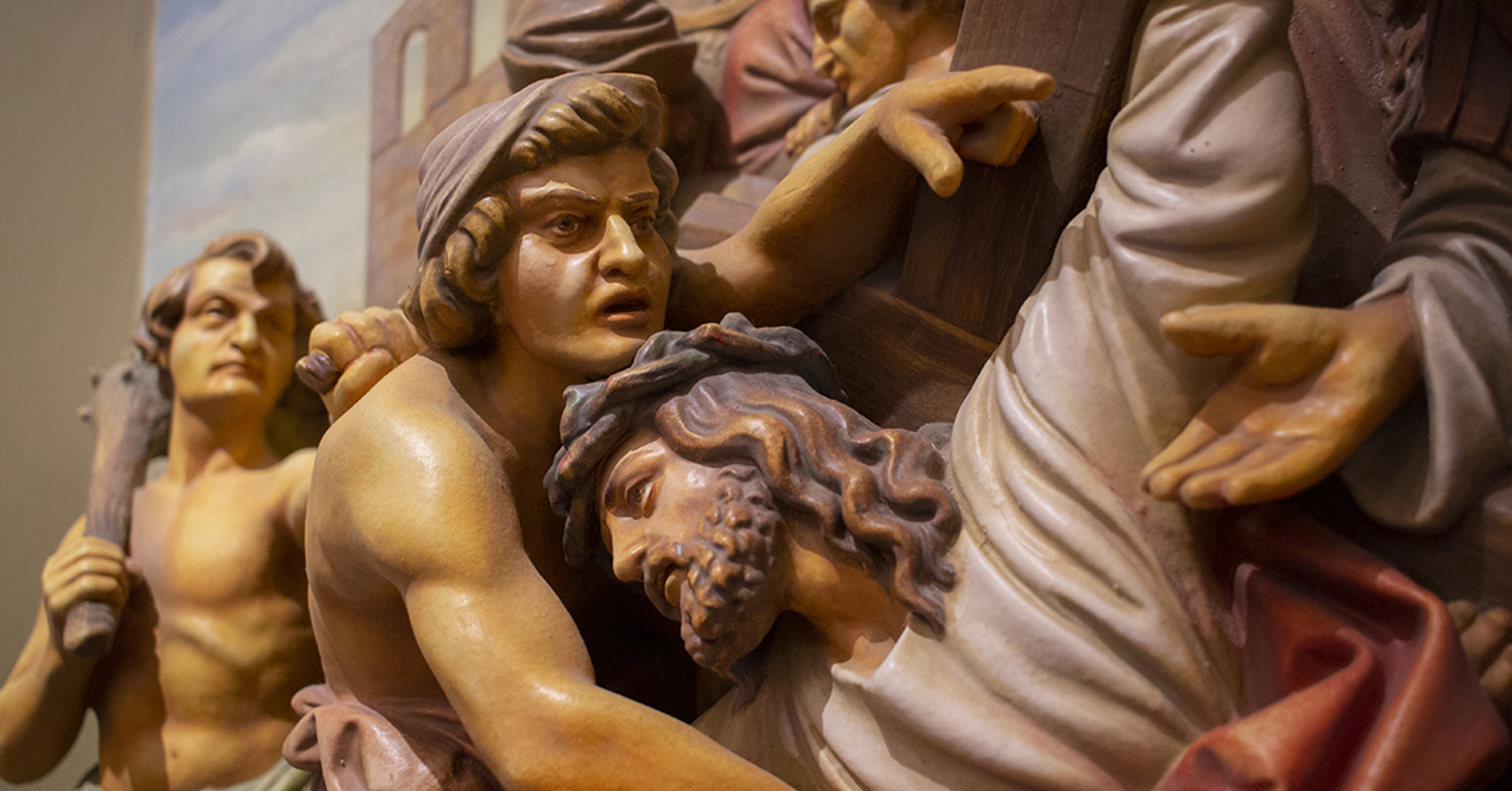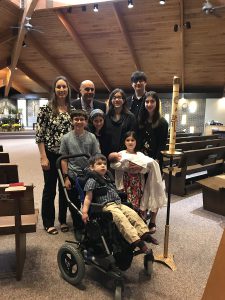
By Renae Kranz
Do you remember when you were young and your mother or grandmother would offer some tidbit of advice to help you through a problem? The one phrase I remember most from my own mother was “offer it up,” usually said in response to some type of suffering I was going through.
My reaction was to roll my eyes or just walk away. I remember thinking, “How is that going to help me?” I didn’t understand what “offer it up” meant and I never bothered to ask. Thinking back, I was probably a really annoying teenager.
Our moms and grandmas had only our happiness and salvation in mind. And guess what? I know now had I listened to their advice and learned more about it, it really would have helped me when life got difficult.
They were wise women, they just didn’t always know how to put into words the power of one little phrase—a phrase that can turn the suffering in our lives into an act of love and sacrifice for those around us.
Redemptive suffering is an act of love
 If you’ve lived very long, you know we all suffer in some way and will continue to suffer at different times in our lives. Our Creator knows this as well. From the beginning, He has watched his creation struggle in sin and had a plan to make our suffering mean something. His plan was the cross of Christ.
If you’ve lived very long, you know we all suffer in some way and will continue to suffer at different times in our lives. Our Creator knows this as well. From the beginning, He has watched his creation struggle in sin and had a plan to make our suffering mean something. His plan was the cross of Christ.
God sent his Son to die for us on the cross, clearing a way to salvation for us. He could have redeemed us in another way that involved less agony for Jesus, but the suffering was a key part of the sacrifice. Knowing how we suffered, God used the suffering of his Son as the means of our redemption so we could take part in that redemption with our own suffering.
In Colossians 1:24, Paul says, “I am now rejoicing in my sufferings for your sake, and in my flesh I am completing what is lacking in Christ’s afflictions for the sake of his body, that is, the church.”
I’ve always been confused by the phrase “what is lacking” in that passage. How can anything be lacking in Christ’s perfect sacrifice on the cross? And why was Paul rejoicing about suffering?
I finally learned the thing that was lacking was me. What’s lacking is all of us. Our role is to unite our suffering with that of Jesus’s to create an eternal offering of love.
Seems like a crazy kind of love, right?
But redemptive suffering is the most beautiful and perfect love. Because while we offer our suffering for others in unity with Christ, He is with us the whole time. He walks with us in that suffering and never leaves us alone.
Offering up our suffering is a powerful way to become like Christ and love others as He loves them. Becoming like Christ and loving like He does is what we were created to do. We are called to love in a radical way, like the divine Son.
We are able to love this way because of grace—the gift of Jesus in our lives. It is impossible for us to love this way on our own. It is only possible with God.
This seems fantastical, doesn’t it? To help show how this gift of offering our suffering for others works, I talked to five people from our diocese who use redemptive suffering to love others in this way. I learned something crucial:
God wastes nothing.
Miracles big and small
When Audrey Anderson was young, she heard the words “offer it up” from her grandmother Lucy (affectionately known by her family as Grams) more than once. But at that time in her life, those words sounded more to her like “oh, buck up” or “get over it.” Grams was an integral part of Audrey learning the true meaning of redemptive suffering.

During her college years, Audrey watched her grandmother suffer from brain and lung cancer at the same time that she needed a hip replacement. The hip replacement had to be put off until the cancer treatments were completed, causing her terrible amounts of pain.
Grams used her suffering for the good of her family, saying a rosary as soon as she woke up every morning, offering a bead for each of her grandchildren as she went. Audrey witnessed many of her cousins come back to the Church at that time.
“I got to not only see her offering her suffering but also see the Lord’s work in that and how He helped to bring redemption to our family because my grandmother was offering her suffering for us,” Audrey said.
Audrey herself became a much stronger Catholic after seeing the great faith of her beloved Grams. She became a missionary for a while and now works for the Diocese of Sioux Falls. Although she knew her grandmother was praying for all of them, several of her cousins who were very vocally against the faith and came back had no idea what Grams was doing. She was a powerful intercessor for them.
That isn’t all of Grams’ story. She left her doctors speechless when she was miraculously healed of her brain cancer. When the doctors gave Grams only six months to live, Audrey and her sister, Stephany, started praying to the intercession of Divine Mercy because Grams had a special devotion to it.
Just before the doctors wheeled Grams in for brain surgery to try to extend her prognosis, she told them, “I trust you and I trust my God.” During surgery they found no tumors. Everything that was on her scans was gone with no medical reason.
When her doctor woke her up, he was dumbfounded. He told her what they found during surgery and said, “We don’t know what happened, but your God seems to be one amazing God.”
Today, Grams is healthy and continues praying for her family members, joining her suffering to Christ’s for the good of their souls. And she has sparked a mission-mentality in Audrey to bring the Lord’s grace to as many people as possible through her own suffering.
Audrey, a parishioner at the Cathedral of Saint Joseph, has a chronic illness that changes from day to day. She feels good one day and struggles the next. She says it can be very painful and confusing. When she has a bad day, she reaches out to the people in her life to ask what they need prayers for.
“It makes the suffering I have to go through, that there is no cure for, bearable,” Audrey said. “Because when I’m in those moments, I know the Lord is redeeming this thing that I can’t get rid of that is plaguing my life. But He’s using it for his good, and he’s using it to bring goodness to others and that makes it easier and worth going through.”
The meaning of that phrase, “offer it up,” has completely changed for her. She’s learned her suffering can have meaning and purpose when she unites it with Christ’s suffering on the cross, using it as an offering to bring good to someone else. And she doesn’t ask for just one thing at a time. God is bigger than that.

“I learned the Lord can stretch a grace,” Audrey says. “When I ask for one thing for a grace, He’ll respond. But if I ask for 20 things for that one piece of suffering, He will respond in his time to all of them. So, if I’m going to have to go through this suffering, why not make it count and reach out to as many people as I can to say, the Lord wants to bring goodness from this.”
The results have been astonishing.
When Audrey went to Mayo Clinic in Rochester for testing to finally get a diagnosis for her symptoms, she knew it was going to be a tough time. She was in such an unhealthy state she could barely walk. Knowing the suffering she would endure, Audrey reached out to loved ones asking what they needed prayers for.
Her sister, who was with her for the appointments, gave Audrey five specific, very big things for her to offer up on her behalf. Over the last two years, God has responded to all of those things in some way. His responses are not always what you might expect, though.
“If He doesn’t take away somebody’s suffering that I’ve prayed for, He’s still probably doing something within that suffering to help them, teach them, to bring consolation in some way, and those are still answers to my prayers,” Audrey says. “Even if it isn’t cured, that they still be brought closer to God in some way.”
Her many visits to Mayo have proven fruitful over the last few years. During one trip, Father Jeff Norfolk asked Audrey to pray for an outpouring of grace on his students at the Newman Center at USD (where he was director at the time). When she returned home, Father Norfolk contacted her to ask if she had prayed for his students. Of course, she had offered her suffering for them on Ash Wednesday.
In an excited voice, Father Norfolk told Audrey the Newman Center was packed to standing room only for Ash Wednesday Mass, a Mass they usually don’t get a lot of students to attend. And, the priest at St. Agnes Parish in Vermillion had called him to see if he had cancelled Mass because he had so many students who came to their Ash Wednesday Mass as well.
“So there was an outpouring of these young people at USD campus who wanted to make an effort to enter into Lent and to get back to their faith for that Lenten season,” Audrey said. “And I thought, ‘Wow Lord! When you respond, you respond!’”
Audrey has found God responds to her needs even without her asking. When she offers her suffering for others, quite often her pain is lessened. There are even times she feels prompted to offer prayers for unknown needs.
“I will just pray, ‘Lord whoever this is intended for, whoever needs it most, I’m offering this for you.’ Because we never want to waste a suffering,” Audrey says. “I have no idea who those people are, and I won’t know until I get to heaven, but I know He is doing something. He is restoring something. He is honoring that request in some way in someone and they’re receiving help because of that.
“It brings a lot of hope into your life that something so good and so beautiful is brought from something that is so hard. Jesus is the way-maker.”
Bringing light into darkness

Father Norfolk, now pastor at Risen Savior Parish, Brandon, and prison chaplain, has seen a change in the meaning of suffering for himself over the years. Early on he felt a distance from God, like he was suffering here and offering it up to God up there. He realized later he was missing the fact that Christ walked in the suffering with him. There was no gap between them at all, only unity.
“What’s helped me with that is when I’m suffering, praying or fasting, Christ is with me suffering,” Father Norfolk says. “Christ is praying with me. Christ is fasting with me. Christ is in me experiencing it with me because He lives in me.”
Father Norfolk says he wrestled with surrendering suffering to God for quite a while, thinking he had to “white knuckle it” and get through it on his own. He finally realized Christ was trying to teach him that surrendering would draw him closer to the Lord. He believes God allows suffering as a way to draw us back to himself. Since Jesus suffered, it’s a guarantee we’re going to suffer as well.
“We can make a decision, either I’m going to get angry and frustrated and even point the finger and blame God,” Father Norfolk says. “Or I can use this to help me draw closer to Him, and I can allow this suffering to be a way to help others as well by offering suffering on behalf of someone, offering it as a prayer on behalf of even the person who’s causing me to suffer. I can praise you and thank you that you’re going to bring good out of this.”
If you don’t have a specific suffering to offer but have someone who needs prayers, Father Norfolk says not to forget about the power of fasting. He regularly offers prayer and fasting for his family members who are away from the Church. It has opened doors to make conversations possible with them that he didn’t think would ever happen. He prays their hearts will continue to be open.
As prison chaplain, Father Norfolk works to help prisoners understand and experience Christ suffering with them during their incarceration. When they grab on to this idea, he says it blows the doors open. It’s a source of freedom for them, even in a six-by-nine cell where loneliness and fear are prevalent.
“They want some kind of value to what they’re experiencing,” Father Norfolk says. “They want to know there’s good that can come out of this, either for themselves or they can offer it for other people. They can still have hope that I’m not alone. Christ is present.”
He said yes to prison ministry because he wanted to see the light of Christ “break into those walls, inside the lives of the men, the women and the staff.” The impact on his life has been huge.
“I saw Christ bring meaning and purpose through my parents’ divorce, through hardships even as a priest that I’ve experienced,” he said. “I want to share that with anybody who will listen and anybody I can help pray into their life to help them experience that light in the midst of the darkness.”
Many ways to unite with Christ

“Offer it up” can stir up different feelings in different people, but it always transforms suffering into love. For Jackie Sempek, parishioner at St. Benedict Parish in Yankton, it’s a gift to cooperate in the redemptive suffering of our Lord.
“When I can freely and intentionally turn to Jesus with something that is difficult for me to bear and give it to him with real love for another, it becomes something so much more,” Jackie says. “It brings me into union with Jesus.”
But she points out when someone is in deep suffering, telling them to offer it up can sometimes feel dismissive, so we must be empathetic. She suggests offering it up to Jesus for them.
“We could say, ‘Dear Jesus, Jackie’s pretty upset right now about losing her keys, but I know if she were in her right mind she would give this suffering to you for (name the situation or person). Since she can’t right now, I’ll do it for her.’”
Jackie has made a practice of offering suffering for years now, but she recalls especially a time she struggled mightily with a situation in her family life. Whenever the struggle presented itself, she offered it for a particular intention. After a bit of time, she says the problem dissolved before her eyes. She was amazed at what cooperating with God could do.
“Not only was the situation rectified, but I grew in a deeper sense of hope and trust in God in the process,” Jackie says.
Even though these acts of redemptive suffering can be difficult for Jackie, they have taught her the grace of surrender and changed her life.
“So often I would prefer to spend a lot of time lamenting my circumstances and trying to fix things myself,” Jackie says. “Offering it up helps to give my suffering meaning and purpose. In the end, that’s easier. I find that my sufferings are always a great place for me to meet the Lord.”
Katie Sanchez can identify with Jackie’s struggles. She and husband Mike, parishioners at St. Magdalen Parish in Lennox, both practice offering up their suffering, and it took on a whole new meaning after their seventh child was diagnosed with a brain abnormality. She says he can do nothing for himself, but he’s a sweet soul who blesses their family.
She often prays her favorite prayer, the Universal Prayer, in the midst of their struggles with his care:
I want whatever you want, because you want it, the way you want it, as long as you want it.
During those times it can be hard for her to pray.

“My mind could not settle; my thoughts would just go to trying to understand my son’s disability,” Katie said. “So, I became very grateful for the people who said they would pray for us, because my personal prayer and our family prayer were suffering. Like any never ending difficulty, it is wearing.”
She says they are sustained by the support they receive from family, friends and their parish. And she continues to offer her struggles, even when she doesn’t feel like it. Her prayer life with her husband and children offer a reprieve from the storms of life. And she continues to say to the Lord, “Yes, we will keep persevering.”
Katie’s husband Mike finds it easier to pray through the difficult times, so he becomes a great source of support for Katie. For Mike, offering up suffering gives him the grace to endure the hardships, emotions and setbacks life throws at them. He focuses on using those discomforts for the benefit of others.
“It can be very difficult to see how suffering can bring about a greater good, especially when we are smack dab in the middle of the suffering,” Mike says. “Yet, by accepting the suffering and embracing it, we are uniting that suffering back to the suffering Jesus had while on the cross. The realization that we must get through Good Friday in order to celebrate on Easter morning.”
Mike and Katie have seen countless fruits from the prayers of others working in their lives. Everything that has happened to them over the years has prepared them for what they do now as parents.
“It is usually when I think back about how we made it through a difficult period that I realize how much we were aided by the prayers of others,” Mike says. “Therefore, I think when you offer your suffering for a greater good/purpose, you will be given the strength to handle your crosses laid before you.”
Offer it up on behalf of others
The act of redemptive suffering by Christ on the cross destroyed death and the eternal effects of sin. Our prayers and offering our suffering in unity with Christ to complete the redemptive act hold that same power. As Audrey says, don’t waste them.
“It’s always important to remember that at the end of the day, the Lord is in control and He is a loving and good God, and He knows each of us personally so He knows what is best,” she says. “So even if he doesn’t choose to answer in the time or the way in which we’re asking for, He’s still answering. That’s part of praying well is knowing He has our ultimate good in mind. And He is answering them.”
15 things to do in the midst of suffering
When we understand suffering, we are people who can relieve suffering.
- When in suffering, understand we have been called to participate in the redemption of the world. It’s an opportunity to become like Jesus. God causes all things to work together for good.
- Entrust yourself to God. Since Christ suffered, he is our example of how to follow him in suffering. He had no sin, but he suffered for us. He consciously trusted in God his Father.
- Unite your will with the will of Christ through prayer. His plans are our plans.
- Realize Jesus will not allow you to go through something you cannot handle. My grace is sufficient for you.
- Embrace the suffering, conscious of the fact God’s grace is available, active and effective. His life is available in the midst of suffering in the sacraments.
- Go to confession. Focus on eliminating sin which weakens our relationship with Jesus.
- Participate during Mass. Join your sufferings during offertory and when the gifts are brought to the altar. He takes our suffering and offers it up to the Father.
- Avoid illegitimate suffering (suffering you bring on yourself). Instead, suffer well, as Christ did.
- Think of others and offer your suffering up for them.
- Actively love by doing what is right according to your vocation.
- Pray the Rosary. Mary mediates for us with her Son in the midst of our sufferings.
- Study the saints. They were perfected by uniting their will with Christ’s.
- Rejoice that we can share in the redemption of the world.
- Keep an eternal perspective.
- Trust God for the fruit of your suffering. You don’t need to see the results. He may allow you to, but it isn’t necessary. Trust it has happened.
Attributed to Jeff Cavins, author and evangelist


